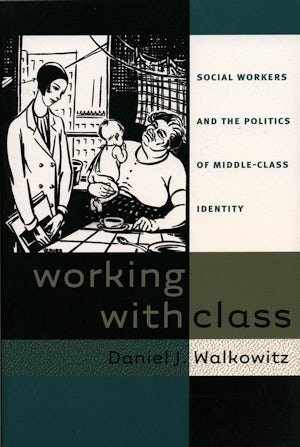Working with Class
Social Workers and the Politics of Middle-Class Identity
By Daniel J. Walkowitz
440 pp., 6.125 x 9.25, appends., notes, bibl., index
-
Paperback ISBN: 978-0-8078-4758-9
Published: March 1999 -
E-book EPUB ISBN: 978-0-8078-6120-2
Published: July 2003 -
E-book PDF ISBN: 979-8-8908-7051-3
Published: July 2003
Buy this Book
- Paperback $47.50
- E-Book $29.99
For Professors:
Free E-Exam Copies
Walkowitz uses the study of social workers to explore the interplay of race, ethnicity, and gender with class. He examines the trade union movement within the mostly female field of social work and looks at how a paradigmatic conflict between blacks and Jews in New York City during the 1960s shaped late-twentieth-century social policy concerning work, opportunity, and entitlements. In all, this is a story about the ways race and gender divisions in American society have underlain the confusion about the identity and role of the middle class.
About the Author
A labor historian and filmmaker, Daniel J. Walkowitz is director of the Metropolitan Studies Program and professor of history at New York University.
For more information about Daniel J. Walkowitz, visit
the
Author
Page.
Reviews
"[This] book should become one of the touchstone monographs on American social work."--American Historical Review
"This is an excellent history of the rise of radicalism . . . [and] an important contribution to the historical literature on the fate of radicalism in American society."--Richard A. Cloward, New Labor Forum
"This remarkable volume assays more vital subjects and touches upon more contentious issues than any one monograph or author could treat comprehensively."--Journal of American History
"Walkowitz is both a gifted and a sophisticated historian, and the bulk of the book contains case studies that illustrate the changing ways in which social workers organized to protect their professional and middle-class identities. In creating these case studies, Walkowitz writes with a special sensitivity to the ways in which race and gender influenced events."--Labor History
"An excellent history of the rise of radicalism, including red unions, among the staff in the Jewish federation of social agencies and among Jewish staff in New York City’s Department of Welfare during the 1930s, and of the repression that followed in the postwar years. It is an important contribution to the historical literature on the fate of radicalism in American society, if only in one place among one group."--New Labor Forum
"A trenchant critique of the trajectory of social work."Stanley Aronowitz--The Nation




